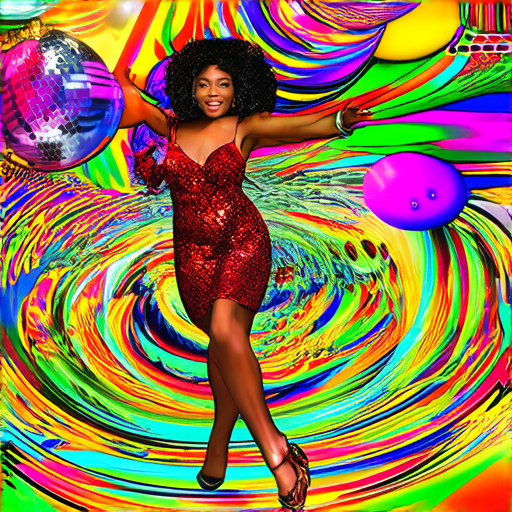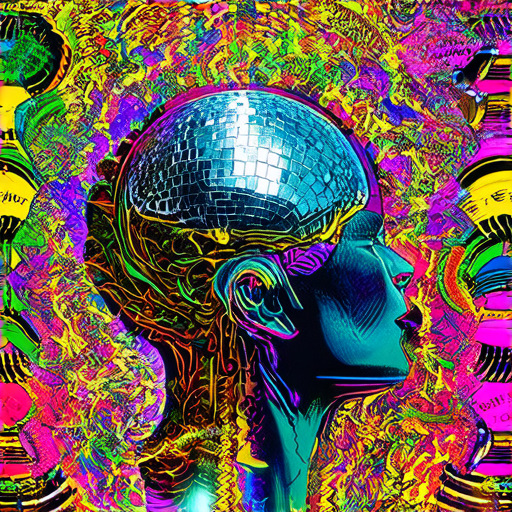Music has long been recognized as a powerful force capable of shaping cultures, influencing societal norms, and reflecting the values of its time. Among the many genres that have left an indelible mark on history, funk music stands out for its unique ability to capture the essence of social change, embodying the spirit of resistance and self-expression that defined the era of its emergence. As we delve into the world of funk, we’ll explore how this genre came to symbolize a particular moment in history, its origins, and the profound impact it had on both individual minds and collective societies.

Cultural Impact of Music
Music has been a vital part of human culture for centuries, influencing various aspects of society, including social norms, politics, and identity.
- Racism within the music industry has led to unequal opportunities for artists from diverse backgrounds.
- The content of certain genres of music pushes conventional ideas of morality, often sparking controversy and debate.
- The physical appearance of individual performers can shape public perception and influence cultural attitudes towards body image and self-expression.
Musical Influences on Culture
Music has the power to unite people across cultures, fostering empathy and understanding through shared experiences and emotions.
- Funk, Soul, and Jazz Fusion: These genres have played a significant role in shaping American music and culture, with artists like James Brown, Aretha Franklin, and Miles Davis pushing boundaries and challenging societal norms.
- Globalization and Cultural Exchange: Music has facilitated cross-cultural exchange, introducing new sounds, styles, and influences to global audiences, and reflecting the complexities of globalization.
- Social Justice and Activism: Music has long been a powerful tool for social change, with artists using their platforms to raise awareness about issues like racism, inequality, and environmental degradation.
Conclusion
Music’s cultural impact extends far beyond entertainment, influencing our values, attitudes, and behaviors. By exploring the complex relationships between music, culture, and society, we can gain a deeper understanding of the ways in which art shapes our world and ourselves.
Funk Music Symbolism
Funk music has been a powerful force in shaping culture and society since its emergence in the 1960s.
-
Social Commentary
Funk music often served as a vehicle for social commentary, addressing issues such as racism, inequality, and social justice.
- Musicians like Parliament-Funkadelic and Sly and the Family Stone used funk to critique societal norms and challenge the status quo.
- Their music often incorporated elements of Afrofuturism, exploring themes of black identity, technology, and science fiction.
-
Personal Liberation
Funk music also symbolized personal liberation and empowerment, particularly among African Americans during the Civil Rights Movement.
- Musicians like James Brown and Earth, Wind & Fire used funk to express feelings of freedom and joy, inspiring listeners to take control of their lives.
- Their music often featured catchy hooks and danceable beats, making it accessible to a wider audience and helping to spread the funk movement.
-
Cultural Significance
Funk music played a significant role in shaping popular culture, influencing everything from fashion to film and television.
- The genre’s emphasis on rhythm and groove helped pave the way for later styles like disco, hip-hop, and electronic dance music.
- Funk’s influence can be heard in the work of artists like Prince, Michael Jackson, and Kendrick Lamar, who have all cited funk as a major inspiration.
Tiger Funk celebrates the rich history and cultural significance of funk music, offering in-depth articles, artist profiles, and album reviews that explore the genre’s enduring impact on modern music.
From its roots in African American culture to its influence on contemporary styles, funk remains a vital and dynamic force in the world of music.
At Tiger Funk, we’re committed to sharing the story of funk and its continued relevance today.

The Socio-Political Effect of Funk Music
Funk music has been a powerful force in shaping the socio-political landscape of urban black communities since its emergence in the late 1960s.
-
Empowerment through Self-Expression
Funk music allowed African Americans to express themselves freely, telling their own stories and experiences through lyrics and melodies.
-
Challenging Social Norms
Funk music challenged traditional social norms and conventions, promoting a sense of rebellion and nonconformity among its listeners.
-
Racial Identity and Pride
Funk music played a significant role in fostering racial identity and pride among African Americans, providing a sense of community and shared experience.
-
Cultural Significance
Funk music has had a lasting impact on popular culture, influencing a wide range of musical genres and inspiring countless artists and musicians.
Key Artists and Bands
- Tyrone Lanford, aka Tyrone Davis – Known for his smooth vocals and hits like “Can I Change My Mind” and “Turn Back the Hands of Time”
- George Clinton – A pioneer of P-Funk and leader of Parliament-Funkadelic, known for his innovative production style and socially conscious lyrics
- James Brown – Often referred to as the “Godfather of Soul,” James Brown was a major influence on the development of funk music and a key figure in the Civil Rights Movement
- The Meters – A New Orleans-based band known for their funky grooves and hits like “Cissy Strut” and “Fire on the Bayou”
Legacy and Impact
Funk music continues to have a profound impact on contemporary society, influencing everything from hip-hop and R&B to rock and pop music.
Its legacy can be seen in the many artists who have drawn inspiration from funk, including Prince, Michael Jackson, and Kendrick Lamar.
Funk music remains a powerful symbol of resistance and self-expression, continuing to inspire new generations of musicians and fans alike.

Is Funk Black Culture?
Funk is a music genre that originated in African-American communities in the mid-1960s.
- The genre emerged as a result of a mixture of various music styles that were popular among African-Americans during the mid-20th century.
- Funk music is characterized by its strong emphasis on rhythm, groove, and danceability.
Tiger Funk’s Perspective
At Tiger Funk, we believe that funk music is deeply rooted in African-American culture and history.
- We recognize the significant contributions of African-American musicians who helped shape the funk genre.
- Our platform aims to celebrate the rich heritage and cultural significance of funk music, while also exploring its ongoing influence on contemporary music.
Competitors and Collaborations
While there are other platforms that share our passion for funk music, we believe that our unique approach sets us apart.
- We collaborate with other music enthusiasts and experts to provide a comprehensive understanding of funk’s history and evolution.
- Our platform features in-depth articles, artist profiles, and album reviews that showcase the diversity and richness of funk music.
African-American Influence on Funk Music
Funk music has been shaped by African-American experiences, traditions, and cultural expressions.
- African-American musicians drew upon their own musical heritage, incorporating elements of blues, gospel, and jazz into funk.
- The genre’s emphasis on rhythm and groove reflects the African-American tradition of storytelling through music.
Conclusion
In conclusion, funk music is indeed a product of African-American culture and history.
We hope that our platform provides a valuable resource for those interested in learning more about funk’s rich heritage and ongoing influence on contemporary music.
Cultural Impact of Funk
Funk has been a driving force behind numerous social movements and cultural shifts, leaving an indelible mark on the world. As a genre, funk embodies the spirit of rebellion and self-expression, allowing individuals to tap into their deepest emotions and desires.
- Funk as a Symbol of Freedom:
- Influence on Fashion:
- Linguistic Evolution:
- Dance and Movement:
Funk’s infectious rhythms and energetic beats have long served as a symbol of freedom and empowerment, particularly for African-American communities.
Funk’s bold and eclectic style has influenced fashion, with its signature flair for bright colors, patterns, and statement pieces continuing to shape the industry today.
Funk’s unique vocabulary and slang have contributed significantly to the development of modern language, with terms like “get down” and “funky” becoming ingrained in popular culture.
Funk’s dynamic dance styles, characterized by smooth, fluid movements and energetic flair, continue to inspire new generations of dancers and choreographers.
The Evolution of Funk
As a genre, funk has undergone significant transformations since its inception, incorporating various influences and styles along the way. From its roots in soul and R&B to its later fusion with rock and electronic music, funk continues to adapt and evolve, reflecting the changing tastes and preferences of its audience.
- Pioneers of Funk:
- Funk’s Influence on Modern Music:
- Contemporary Funk Scene:
Artists like James Brown, Sly and the Family Stone, and Parliament-Funkadelic helped establish funk as a distinct genre, pushing the boundaries of what was possible with rhythm and melody.
Funk’s impact can be heard in a wide range of contemporary genres, from hip-hop and electronic to rock and pop, with many artists drawing inspiration from funk’s innovative production techniques and catchy hooks.
Today, funk remains a vibrant and thriving genre, with new artists and bands emerging to carry on the tradition of innovation and experimentation that defines funk.
Conclusion
Funk’s enduring legacy is a testament to its power as a cultural force, inspiring countless individuals and communities around the world. As we look to the future, it’s clear that funk will continue to play a vital role in shaping the sounds and styles of tomorrow.
What Ethnicity is Funk?
Funk is a genre of music that originated in the 1960s, primarily among African American communities in the United States.
- The term “funk” has its roots in the Wolof language, spoken in West Africa, particularly in Senegal and The Gambia.
- In Wolof, the word “funki” means “smell,” which refers to the strong, pungent smell of sweat and body odor associated with African dance traditions.
As African Americans brought their musical traditions to the Americas, the term “funk” evolved to describe the energetic, rhythmic sound of their music.
- Early funk music was characterized by its emphasis on rhythm, groove, and percussive beats, often featuring instruments like the bass guitar, drums, and congas.
- Funk music drew inspiration from various African American musical styles, including blues, gospel, and jazz.
Today, funk remains a vibrant and influential genre, with artists continuing to push the boundaries of its sound and style.
Evolution of Funk Music
Funk music has undergone significant transformations since its inception, incorporating diverse influences and styles.
- Classic funk, exemplified by artists like James Brown and Sly and the Family Stone, emphasized strong rhythms and catchy melodies.
- Later developments, such as disco-funk and electro-funk, incorporated electronic elements and synthesizers.
- Modern funk, represented by artists like D’Angelo and Thundercat, blends traditional funk with contemporary R&B and hip-hop influences.
Throughout its evolution, funk music has remained true to its core spirit: a celebration of rhythm, energy, and self-expression.
Conclusion
Funk is a genre born out of African American musical traditions, shaped by the experiences and creativity of Black communities in the United States.
From its origins in West Africa to its global influence today, funk music continues to thrive, inspiring new generations of musicians and fans alike.

0 Comments